Exploring motivation, reverse motivation and getting motivated when struggling with depression
Mental Health Chat and motivation
Yesterday, just as I was finishing work for the day, I noticed that the #MHChat (Mental Health  Chat) theme for the week was motivation. #MHChat is a twitter event where @MHChat poses questions on a weekly theme to encourage discussion. The question that caught my eye this week was:
Chat) theme for the week was motivation. #MHChat is a twitter event where @MHChat poses questions on a weekly theme to encourage discussion. The question that caught my eye this week was:
Given that this is mental health chat, I responded with some thoughts on the reverse 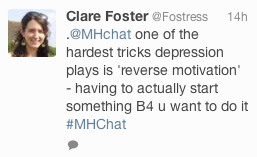 motivation that depression can create. To give an example; when I am depressed the last thing that I feel like doing is going for a run. I try and get out there and get going – ‘going through the motions’ – despite this lack of motivation. As I get going I gradually gain a different perspective and start to feel motivated to continue.
motivation that depression can create. To give an example; when I am depressed the last thing that I feel like doing is going for a run. I try and get out there and get going – ‘going through the motions’ – despite this lack of motivation. As I get going I gradually gain a different perspective and start to feel motivated to continue.
A few people in the discussion became interested and asked a couple of great questions back. 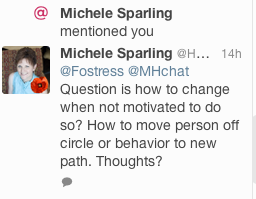
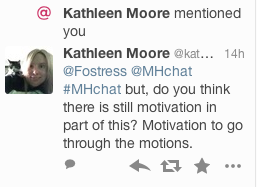
Doesn’t ‘going through the motions’ still require motivation?
I was really interested in Kathleen’s question. It really forces us to explore in depth what we mean when we talk about motivation.
For me, the concept of ‘motivation’ and ‘reverse motivation’ are great shorthands for getting  my head around the experience of not feeling like doing something at all, but in doing it, starting to change my perspective on it, to enjoy it and to feel better in a way I couldn’t imagine prior to getting started.
my head around the experience of not feeling like doing something at all, but in doing it, starting to change my perspective on it, to enjoy it and to feel better in a way I couldn’t imagine prior to getting started.
Understanding this experience and having the words to frame it really helps me to manage it successfully when I recognise it happening.
If motivation is defined as something essential to any action, whatever it is that makes us do something rather than nothing, then Kathleen is right. We will still be motivated to take action when depressed. We’ll be motivated to go through the motions as we know it works.
However, I think there is still a distinction to be made. I may be motivated to ‘go through the motions’ but when I’m depressed I can’t imagine how it is going to help me. When I’m well my motivation is made up of a complex mix of intellectual and emotional reasons. I know going for a run (for example) will make me feel good AND I can remember and imagine what that feeling will be like. It’s a no brainer.
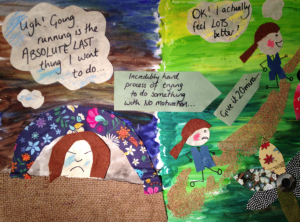
But when I’m depressed, my initial motivation is very thin. Rationally I know that going for a run will make me feel better but emotionally I’ve got nothing. I can’t imagine what that feeling better is going to look like. And that makes it much harder to get going. It’s only when I get started and am feeling the benefits that I begin to remember what feeling better feels like. Then I want to keep going and my motivation is back up to full strength.
Internal and external motivation and gamification
Michele’s question wasn’t so much about the nature of motivation but about how we can help ourselves and others who are experiencing this nasty piece of mental trickery to change. How can we help ourselves when we’re experiencing reverse motivation – move from under the covers to out in the park, from on the sofa to meet a friend, from curled up in the corner to the office?
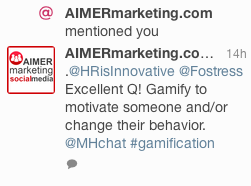 A marketing company also involved in the chat suggested gamification – making something into a game, using game thinking and mechanics in non game situations to engage people in solving problems. Which is fair enough. I’ve seen this done online a number of times – Happify being a prime example. But, at least in the first instance, this makes the motivation external “I should go for a run because if I do I will get points to add to my runners profile. I’ve nearly got enough for a badge“. But what happens when I say “I don’t actually give a shit about my stupid runner’s profile,it’s all pointless anyway”. Which is pretty likely when I’m depressed. What then?
A marketing company also involved in the chat suggested gamification – making something into a game, using game thinking and mechanics in non game situations to engage people in solving problems. Which is fair enough. I’ve seen this done online a number of times – Happify being a prime example. But, at least in the first instance, this makes the motivation external “I should go for a run because if I do I will get points to add to my runners profile. I’ve nearly got enough for a badge“. But what happens when I say “I don’t actually give a shit about my stupid runner’s profile,it’s all pointless anyway”. Which is pretty likely when I’m depressed. What then?
In order to ensure we get up and go through those motions, we need our motivation to be internal. We need to find something to do the job of the emotional element of motivation when we’re depressed. Something to at least remind us that we can feel more positive, even if we can’t feel it right then.
I’m not sure there is an easy answer to this problem. If there was, depression wouldn’t be so hideously difficult to find our way out of. But there are things that help. I use the metaphor of sending notes between two islands. Finding ways to remind ourselves when we’re depressed of how it feels to not be depressed. I find writing letters to my depressed self helpful. I find Mindfulness Based Cognitive Therapy helpful. I find involving my boyfriend helpful, working with him to create an action plan for what he can do or say when I’m depressed to get me moving. And then really trying to listen to him when he’s helping me – even if, from a depressed perspective, it doesn’t feel like he’s talking sense. I find describing my experiences to myself using metaphors helpful to improve my understanding of what I need.
I’m still exploring how to navigate the tricks a depressed mind plays and work out a patchwork of understanding, knowledge and support that helps when I need it.
What works for you?

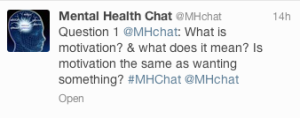
Hey, Great post!
I know what is it like to be in depression for a long time. I know what is it like to stare at the walls for hours, thinking about nothing at all, just feeling the emptiness within. I know that depression whispers bad things in your ear about your capabilities. Creating motivation when feeling depressed can be one of the most difficult things a person can do. The necessary first step to conquering depression is knowing that it will be good for you to take the steps to move forward. Just do remember you do have the power to increase your motivation and to break out of depression. It may take some effort , but the opportunity is there. Remember that will power is everything.